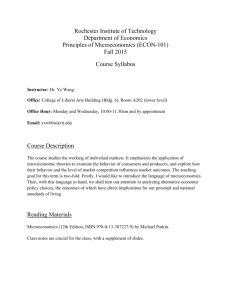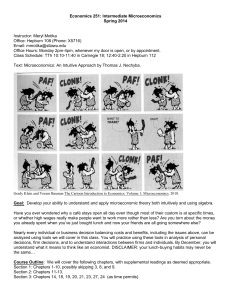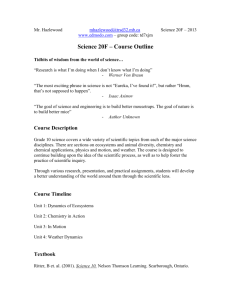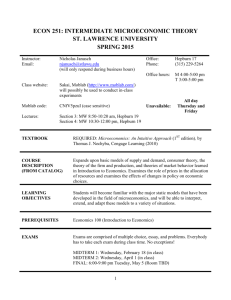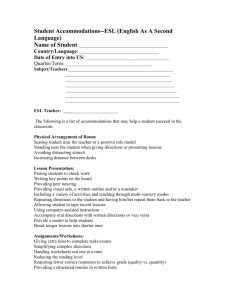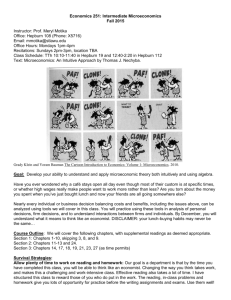Economics 251: Intermediate Microeconomics Fall 2013 Instructor
advertisement
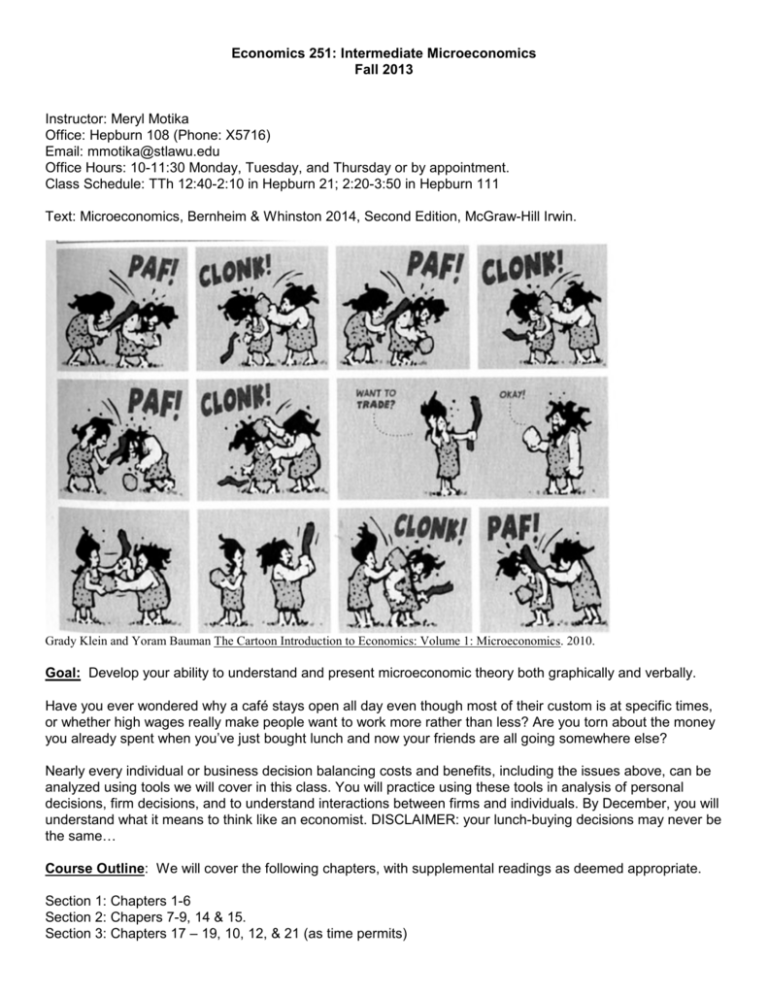
Economics 251: Intermediate Microeconomics Fall 2013 Instructor: Meryl Motika Office: Hepburn 108 (Phone: X5716) Email: mmotika@stlawu.edu Office Hours: 10-11:30 Monday, Tuesday, and Thursday or by appointment. Class Schedule: TTh 12:40-2:10 in Hepburn 21; 2:20-3:50 in Hepburn 111 Text: Microeconomics, Bernheim & Whinston 2014, Second Edition, McGraw-Hill Irwin. Grady Klein and Yoram Bauman The Cartoon Introduction to Economics: Volume 1: Microeconomics. 2010. Goal: Develop your ability to understand and present microeconomic theory both graphically and verbally. Have you ever wondered why a café stays open all day even though most of their custom is at specific times, or whether high wages really make people want to work more rather than less? Are you torn about the money you already spent when you’ve just bought lunch and now your friends are all going somewhere else? Nearly every individual or business decision balancing costs and benefits, including the issues above, can be analyzed using tools we will cover in this class. You will practice using these tools in analysis of personal decisions, firm decisions, and to understand interactions between firms and individuals. By December, you will understand what it means to think like an economist. DISCLAIMER: your lunch-buying decisions may never be the same… Course Outline: We will cover the following chapters, with supplemental readings as deemed appropriate. Section 1: Chapters 1-6 Section 2: Chapers 7-9, 14 & 15. Section 3: Chapters 17 – 19, 10, 12, & 21 (as time permits) Exams: Exam 1: Exam 2: Exam 3: Tuesday, October 1 Tuesday, November 5 Tuesday, December 17 @ 6:00 p.m. The exams will be given a weight of 100 points each in the final grade. Exams are comprised of multiple choice, essay and problems. Permission to miss an exam must be secured from the instructor in advance. Unexcused absences will result in a grade of zero for the exam. The format of any make-up exam is at the discretion of the instructor, and will only be given if prior permission to miss an exam is given. Exams are always and everywhere your own individual work. Homework: (100 points) You will be given weekly homework assignments. In the interest of fair warning, I offer the following: The homework assignments are CHALLENGING. You will not be able to begin them the evening before they are due and complete the assignments for class. Homework assignments will have components that require you to address some question using the graphical tools developed in class and the text as a way to understand and present economic theory. Additionally, you will be asked to analyze the model you have presented to address some questions verbally. THESE ANSWERS MUST BE PRESENTED AS COMPLETE SENTENCES AND/OR PARAGRAPHS. “Yes,” even if the correct answer, will not be evaluated as an acceptable answer. This is important to both the goals of the course and as a tool in developing the skills necessary to complete the writing assignments discussed below. Each homework question (and sub-question with a problem) will be graded on a scale of 2 (all correct), 1 (partially correct) and 0 (incorrect) (The “Yes” answer discussed above will be given a 0.). Your homework grade will be based on the percentage of available points that you earn. (If there are 100 problems then there are 200 available points, if you earn 150 of these, your homework grade is 75 out of 100). You are free to communicate with each other however the final product must be your own work. I recommend that you sit on your own when completing the final draft of your homework to ensure it is not too much like someone else’s. Homework assignments and solutions will be posted online. Homework due dates will be Thursdays as determined by the flow of the course. All assignments will be due at the beginning of the class, and NO late work will be accepted since the solutions will be posted shortly after the deadline. Chapter Outlines: (50 points) You will be asked to turn in a chapter outline for each chapter that we cover from the text. This should be independent work. If your work is not independent of other students in either class, you will be given a zero for the chapter outline. If you are deemed to have copied more a second time, you will be given zero grade for this sent of assignments. This is a place where you can substantially help or harm your final grade in the course. These will be due at the beginning of class on the assigned day, and you will be given zero for late work. Writing Assignments: (100 total points, 50 points each). An important part of your experience in this course will be two short writing assignments intended to develop your skill in presenting a well reasoned economic argument. You will be presented with an economic question and asked to, in a coherent essay of 500 words or less, make appropriate use of economic reasoning to answer the question. It is worth noting that an excellent paper may be significantly shorter than 500 words, it is up to you to understand the marginal cost and benefit of additional text in forming your essay. (In other words, using irrelevant material to fill 500 words will very likely hurt your grade.) You need not include a bibliography as there is no particular need for outside sources on these essays. If you do use any outside source, I will expect this be referenced appropriately. Due Dates: Paper 1: Tuesday, October 8. Paper 2: Tuesday, November 12. Papers are due at the beginning of class on the dates above. No late papers will be accepted. Grading: The final grade is based on your scores from three exams, your homework average, the chapter outlines and the short papers. There are a total of 550 points available. Your grade is based on the percent of the 550 points you scored. The grading scale will be no stricter then Grade 4.0 3.75 3.5 3.25 3.0 2.75 2.5 2.25 2.0 1.75 1.50 1.25 1.0 Percent 95-100 91-94 88-90 85-87 82-84 79-81 76-78 73-75 70-72 67-69 64-66 61-63 55-60 Depending on how hard the homework and tests turn out to be, I may need to reduce the points required for each grade. I will keep you informed of any changes. Attendance: Attendance is not required, but is expected and strongly recommended. Honor code: copying and cheating: Cheating will not be tolerated, anyone caught cheating will be punished to the full extent outlined in the student handbook. I will recommend that you receive a minimum punishment of a zero grade in this course if you are deemed guilty of academic dishonesty on exams or the papers and a zero grade on the homework portion of your grade if found guilty on homework assignments. Students with disabilities: If you have a disability and may need accommodations please be sure to contact the Disability and Accessibility Services Office right away so they can help you get the accommodations you require: http://www.stlawu.edu/special-needs. If you will need to use any accommodations in this class, please talk with me early so you can have the best possible experience this semester. Although not required, I would like to know of any accommodations that are needed at least 10 days before a test, so please see me soon.


